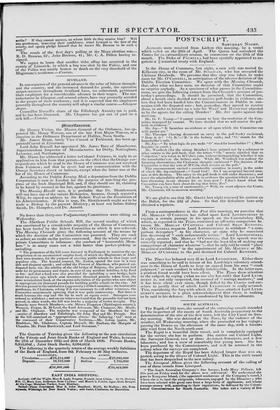No fewer than thirty-one ParliamentaryCommittees were sitting on Wednesday. The
Aberdeen Public Schools Bill, the second reading of which was sanctioned by a considerable majority of the House of Commons, has been Lurked by the Select Committee to which it was referred. The Morning Chronicle gives the following account of the means by which the decision of the Committee was procured. They are such as reflect no credit on the parties concerned. But the whole system of private Committees is infamous : the conduct of "honourable Mem- bers" is in many cases not a whit better than pocket-picking or swindling.
" The promoters of the bill came forward to Parliament to sanction the ap- propriation of an accumulated surplus fund, of which the Magistrates of Aber- deen were trustees, for the purpose of erecting public schools in that large and populous city. The learned counsel, Mr. Austin, opened the case in a very able and eloquent speech ; and called the Provost of Aberdeen who proved un- disputed facts, viz, the solidity of the old bridge of Balgony, ;he provision laid aside for its permanency and repair, in case of any accident befalling it by flood or fire : and that a fund was also provided for upholding a new bridge, built about ten years ago, which cost seventeen thousand pounds, taken from the same accumulated fund, at the express solicitation of the parties who now object to appropriate six thousand pounds for building public schools in the city. All this was proved to the satisfaction (apparently) of the Committee ; the honourable gentleman, its Chairman, asking if it was necessary to call other witnesses, the Committee unanimously agreeing that it was quite unnecessary. But there is much between the cup and the lip in such an equity court. Strangers were ordered to withdraw ; and on our return we found that the preamble had not been proved, in other words, the bill was lost by a majority of twelve to eight. The minority were Scotch Members,—viz. Messrs. Ferguson ( Haddington county), Wenayss, Fergus, R. M'Leod, the Lord Advocate, Mr. Chalmers, Mr. Maule, and Mr. Oliphant. The majority was composed of the Members for the aunties of Aberdeen and Edinburgh, Sir John Hay and Mr. Pringle. But as the bill contained an appropriation clause,' the following ' tail' were at the comniand of their Conservative brethren,—Mr. Lefroy junior, Mr. Bradshaw' Mr. Gladstone, Captain Meynell, Mr. Bonham, the Marquis of Chandos, Mr. Peter Borthwick, and Lord Stormont."


























 Previous page
Previous page